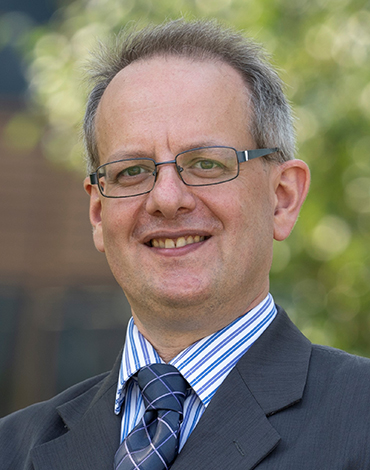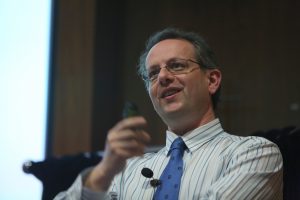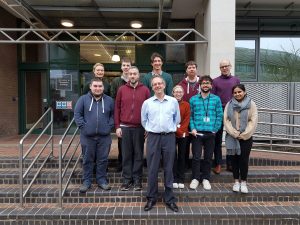
October 26, 2020, by Jo Gregory
Machines can be green: how AI is making chemistry more sustainable.
Jonathan Hirst is a Professor of Computational Chemistry and member of the Green Chemicals Beacon. He has recently been awarded the Royal Academy of Engineering Chair in Emerging Technologies. The prestigious award is a significant financial investment over ten years and will support Jonathan and his team with their aim of developing machine learning models, which will allow sustainable chemists particularly in the pharmaceutical sector to produce drugs and chemicals more efficiently, safely and sustainably.
What does the award mean and what do you hope to achieve?
The core aim is to help chemists make better choices from a sustainability and environmental perspective very early on in the discovery phase of a new project. If this can actually be achieved then there’ll be big dividends downstream, particularly once the chemical process is scaled up. We want to provide some tools that assist chemists in their compound selection and in their synthetic route selection. But we can’t create an algorithm out of nothing. We are going to need to collect the expertise of chemists who are currently at the frontline in the labs and use that knowledge to develop some machine learning techniques that chemists can interact with and interpret and that make sense to them intuitively. That’s the idea in a nutshell!
Do you have an idea of what you want the tools to be?
The project is a more technology-oriented than things I’ve done previously. The first big milestone will be having some software that chemists like to use and that we can use to start capturing some of their data. Electronic lab notebooks are widely used in industry with varying degrees of receptiveness from the end-users and they are used less widely in academia, partly because of price considerations. So we want something that even as a test product is going to feel useful to chemists and not like an extra task they have to do, and getting that up and running is the first big hurdle. We have been working with some chemists on the Prosperity Partnership for a Healthier Nation which is an EPSRC funded project with various colleagues at Nottingham and academics at Strathclyde and colleagues and collaborators at GlaxoSmithKline (GSK), so they are going to be one of our prototypes or focus groups and the other focus group will be the Atoms-2-Products Centre for Doctoral Training in Sustainable Chemistry.
Once we have got something that works for the chemists and gathered some feedback we can then start capturing some of the green chemistry metrics. The challenge with this is that these metrics can be conflicting. So you might have a case where having a reaction in a high yield is a good thing and you might get a lot of what you want, but if you have to use a rare or expensive chemical in the reaction or a highly toxic or difficult to dispose of solvent you can see there will be various sorts of tensions, and we want some machine learning techniques that chemists can actually interact with and include aspects that are of importance to them. We also want them to be able to come back to us and tell us if they actually ended up doing the reaction a different way and feedback the results. We would like to accumulate a sort of community database, something like Wikipedia, but for sustainable chemistry and this will be embodied into the algorithms. And then more broadly it would become used widely across the academic and ultimately industrial communities.
Is the idea for the project to ultimately become a commercial venture?
My interview with the Royal Academy of Engineering actually had a venture capitalist on the panel but the value proposition is not really that we will create our own spin-out company based on commercialising the software. It’s much more about value for UK PLC in that we can make chemical using industries more efficient. For example, in the global pharmaceuticals industry, the annual cost of waste disposal associated with research and development (R&D) of pharmaceutical products and their production is 20 billion US dollars. So the idea is that we would be having an economic impact through getting the software into people’s hands to use. Our intention is to adopt an open-source, open innovation, open data type of approach, which I think has a better chance of being picked up and used, and it will be easier to get different perspectives and feedback on what is working and also people can then mould it to their own specific needs.
How important is machine learning in advancing sustainable chemistry?
It would be too much to say that science won’t advance if we don’t use machine learning, even very generally, but as the amount of data becomes much larger and as the scientific endeavour becomes much more widespread, it is harder for individuals to know everything they need to know, so even just models of data capture is clearly adding a lot of value. There is a lot of work in the field already, but it doesn’t have the unique sustainable chemistry angle that we have. For example, in the development of the drugs that might be used to treat COVID-19, a group of researchers published a better way of synthesizing key molecules, including dexamethasone, using cheaper components. So ultimately we hope that the algorithms will help people come up with more inventive ways and sustainable ways of producing drugs and chemicals but it is very much complementary. We can’t just press a button and solve it all.
What difference will the award make to your team on a day-to-day basis?
The award allows me to build a significantly larger team with some critical mass. It’s going to let me get into the technological side of a lot of nitty-gritty that we just wouldn’t have the capacity to do if it were a standard smaller-scale research project. So hopefully, it will let us cover enough of this ground to have an outcome with substantial impact with a growing user base but it also gives that space for some blue-sky thinking, with many more days open for deep thought, rather than squeezing the research in around the edges. The award allows me to focus all my time on the research. I enjoy teaching and I’ve also undertaken big management roles including Head of School (Chemistry) but it will be nice to have more time to think about research. I don’t expect to be less busy but it will be more focused and having the time for thinking deeply about science is so important.

Jonathan during his time as Head of the School of Chemistry.
How would you describe what you do to an ordinary person?
I work on computational chemistry, which is the process of doing calculations and modelling to support work in the chemistry labs, so turning theories and mathematics into software and using software to predict outcomes of experiments or properties of molecules that would be hard to do in real life. For example, in drug discovery, there’s huge automation and the big companies already do biological measurements on millions and millions of compounds, but even if it’s only 10 pence a measurement if you’re doing a million that is an expensive process. Narrowing down which molecules will be the most productive to make or test is partly what we work on.
What is your background? Were you originally an experimental chemist?
I’ve always worked on the theoretical and computational side of chemistry. Before I came to Nottingham and demonstrated in a teaching lab, the last time I had been in an experimental lab was as a second-year undergraduate. I’m not an experimental chemist at all, although I did order my first chemical in the last couple of years!
What are your inspirations and motivations?
I think it’s fundamentally just intellectual curiosity. I didn’t really set out on a mission to save the world or better mankind. I think the research and scientific endeavour for its own reasons is enormously culturally enriching for humanity never mind any tangible impact. But that said, I did my PhD with what’s now Cancer Research UK, and that was in the area of machine learning 25 years ago. Topical research areas can be a little bit cyclical in that sense. Many might think that Artificial Intelligence (AI) is a new thing, but it’s more of a renaissance. When I was doing my PhD, the film Terminator 2 was released and Arnold Schwarzenegger, the Terminator, had a neural network brain in the movie. So AI is not new and even then that wasn’t the first cycle of hype around AI. The magazine Fortune published in the US ran a feature right back in 1981 about the next revolution for drug discovery being computer-aided. So this has been promised every couple of decades for quite a long time. I guess the most recent cycle comes out of a 2012 competition around machine learning recognising images where there was a significant improvement and that ignited interest in deep learning. One of the big changes is the amount of data and some nice algorithmic developments. For playing games, like chess, where you know the rules and a computer can generate artificial data, you can generate billions and billions of examples and the computer can learn from that. But chemistry is much harder because you don’t know the rules fundamentally and you can’t generate the high fidelity data at the same rate you can for a simple game. So there’s plenty to do!

Jonathan with his research group outside the School of Chemistry pre-COVID
Are you open to colleagues across the Green Chemicals Beacon and the University collaborating with you on the project?
Yes absolutely, one of the key things I will do with my time will be in part building bigger community interactions with industry and getting some interesting uptake from different colleagues within the University and then outside as well so yes, that will be a big part of it.
Why is the award so exciting?
It’s an enormously exciting opportunity, I think because it’s brought together activities across the University, it’s highlighted the investment in high-performance computing, in the digital research strategy, the GSK Carbon Neutral Laboratories for Sustainable Chemistry and the Green Chemicals Beacon. It’s a great way of bringing those different aspects together.
You can find out more about Jonathan’s research on the Hirst Group website.
To find out more about the Green Chemicals Beacon and how our team of researchers are working to secure the low carbon economy of the future, please visit the website or follow us on Twitter @UoN_GCB

I would like to congratulate to our beloved Professor. He was my supervisor on my Ph.D. Journey. I have learned a lot from such a great professor. I wish him the best always.